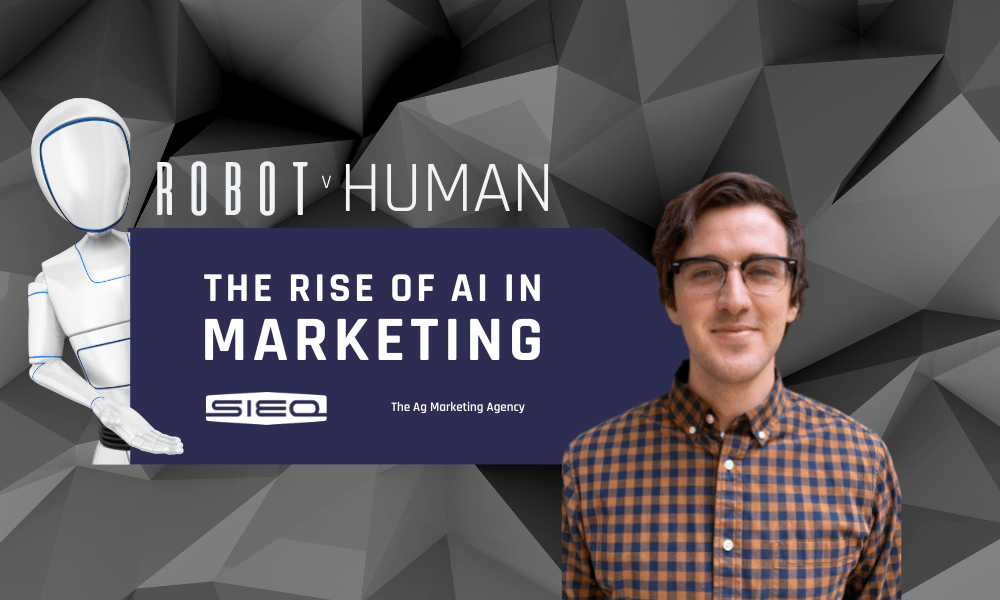Robot v. Human: The Rise of AI in Marketing | SI EQ

There’s no doubt you’ve heard about the rise of artificially intelligent chatbots. Maybe you’ve even used one yourself. Experiments show that these systems are capable of creating original recipes, novels and more. With the recent explosion of viral chatbot systems like ChatGPT, advertisers and consumers are left wondering how this trend might affect marketing.
What does AI have to offer to marketing?
You may be surprised to learn that AI is already widely used in marketing. Systems for targeting ads, gathering keywords and predictive analytics are benefitted regularly by artificial intelligence. Algorithmic ad targeting and predictive analytics, combined with audience segmentation, can greatly improve efficiency in finding an ad’s audience at the right time. Time saved in the creation and placement of advertisements is valuable in that it decreases the overhead investment and ultimately increases profitability.
What’s coming next, then? Will the efficiency of chatbots fully replace the human presence behind marketing? Let’s take a look at what we currently value in marketing.
The Human Element
SI EQ Growth Manager Alex Hanes suggests that the element of humans is deeply valuable to consumers: as AI becomes more and more present in our lives, “the more consumers will crave authenticity.” As the user-generated web2.0 gives way to the AI-rooted web3.0, Alex believes that consumers will continue to crave human-generated content. “Nostalgia and relatability are so powerful because they’re a shared human experience.” This desire to reach back into the past for aesthetic inspiration is commonly mimicked in fashion, art and entertainment.
AI, though, can pull from previously-generated content and, in theory, should be able to create nostalgic content, however originality of that content comes into play if multiple companies are using this tool. If this is true, are humans dispensable in marketing? Not yet, at least.
In conversation with SI EQ Account Executive Nik Hiles, I gathered what he sees to be valuable in ad creation: value, benefits and desire. We know that AI is capable of calculating and predicting a product’s objective benefits to consumers. Value, as well, is easily calculable. Nik suggests, though, that AI, “as of now cannot truly understand human desire.” If artificial intelligence can’t truly predict human desire, as Nik and Alex concede, humans will remain a necessary element behind the creation and placement of marketing content.
The Future of AI in Marketing
Artificial intelligence can be an asset in the process of creating content: a tool, as opposed to a replacement. Chatbots can be a great launching point from which to brainstorm content. Content writers may use AI to view a subject through a fresh lens, using the chatbot’s product to influence or adapt their writing style or voice.
AI can be a great tool for refreshing ideas and will likely improve efficiency in creating content. That said, we believe that original, human-generated content will remain deeply valuable to consumers at large. Additionally, the growing popularity of ChatGPT is stirring conversation regarding whether AI-generated content constitutes plagiarism claims. As chatbots are trained via existent content, it isn’t uncommon for phrases to be reproduced in part or in full. To avoid issues of stolen content, marketers could benefit from using AI as a tool in the process of creating advertisements, as opposed to using it as the sole generator of content.
Staying Creative
Ultimately, consumers are drawn to creative marketing that suits their needs. AI doesn’t need to interfere with that, and in fact, as described above, can be a great asset in generating new ideas or perspectives. To stay creative in the ever-changing environment of marketing, it is important to utilize new tools to your advantage.
6302068f-976c-4bbd-a210-e819c512cb6a.jpg?sfvrsn=9d976afd_3)


